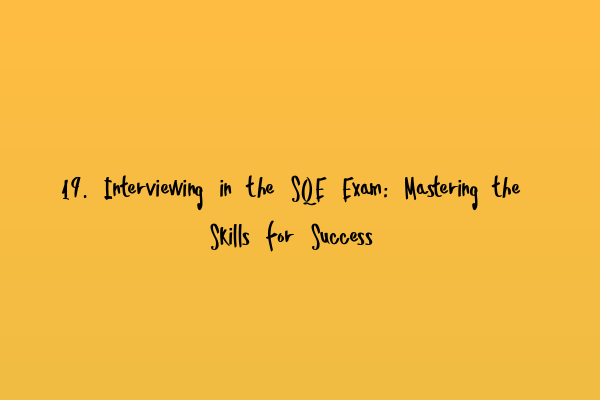19. Interviewing in the SQE Exam: Mastering the Skills for Success
Interviewing is a crucial skill for any aspiring solicitor, and mastering it is essential for success in the SQE exam. In this article, we will explore the key aspects of interviewing in the SQE exam and provide you with valuable tips to help you excel.
Why Is Interviewing Important in the SQE Exam?
In the SQE exam, you will frequently encounter scenarios that require you to conduct interviews with clients, witnesses, or other legal professionals. These interview situations test your ability to gather information, establish rapport, analyze responses, and make accurate judgments.
Effective interviewing skills are not only essential for passing the SQE exam but also for future legal practice. As a solicitor, you will often have to conduct interviews with clients, witnesses, and opposing parties to gather crucial information for your cases.
Furthermore, the SQE exam assesses your ability to handle these interviews ethically, ensuring that you maintain client confidentiality and navigate sensitive topics appropriately.
Mastering Interviewing Skills
To excel in the SQE exam, it is crucial to develop and refine your interviewing skills. Here are some tips to help you master the art of interviewing:
1. Preparation is Key
Before any interview, it is essential to thoroughly prepare by familiarizing yourself with the relevant legal and factual aspects of the case. This includes reviewing the relevant legislation, case law, and any available documentation.
Additionally, anticipate the possible questions or issues that may arise during the interview and prepare appropriate follow-up questions. This will help you stay focused and demonstrate your understanding of the case.
For comprehensive preparation for the SQE exam, consider enrolling in SQE 1 Preparation Courses and SQE 2 Preparation Courses. These courses will provide you with the necessary knowledge and practical training to excel in the exam.
2. Active Listening
Active listening is a critical skill in conducting interviews. It involves fully focusing on the speaker, maintaining eye contact, and genuinely seeking to understand their perspective.
Be attentive to verbal and non-verbal cues, such as tone of voice, facial expressions, or body language, which can provide valuable insights into the interviewee’s mindset and emotions.
By actively listening, you demonstrate empathy and build rapport with the interviewee, which can result in more open and truthful responses.
3. Open-Ended Questions
To elicit detailed and informative responses, ask open-ended questions. These questions encourage the interviewee to provide comprehensive answers, rather than simple yes or no responses.
Open-ended questions typically begin with words such as “what,” “why,” “how,” or “describe.” They allow the interviewee to express their thoughts, feelings, and experiences, providing you with valuable information for analysis.
During your SQE exam preparation, take advantage of SQE 1 Practice Exam Questions and SQE 1 Practice Mocks FLK1 FLK2 to practice formulating open-ended questions and analyzing the responses.
4. Ethical Considerations
Interviewing in the SQE exam requires you to navigate ethical considerations, such as client confidentiality and sensitivity to vulnerable individuals. Always ensure that you respect the interviewee’s rights and maintain the confidentiality of any shared information.
If the interviewee discloses information that raises ethical concerns, be prepared to address these appropriately. Demonstrating your ethical awareness and handling these dilemmas with professionalism will showcase your legal and ethical understanding.
Conclusion
Mastering interviewing skills is essential for success in the SQE exam and future legal practice. By preparing thoroughly, actively listening, asking open-ended questions, and considering ethical considerations, you can enhance your interviewing abilities.
To enhance your SQE exam preparation, check out our SQE 1 Practice Exam Questions and SQE 1 Practice Mocks FLK1 FLK2. Additionally, if you are looking for comprehensive preparation courses, explore our SQE 2 Preparation Courses and SQE 1 Preparation Courses.
Stay updated with the latest SQE exam updates and important dates by referring to the SRA SQE Exam Dates article.
